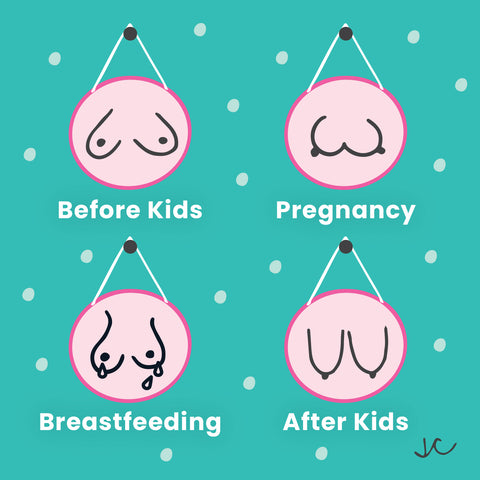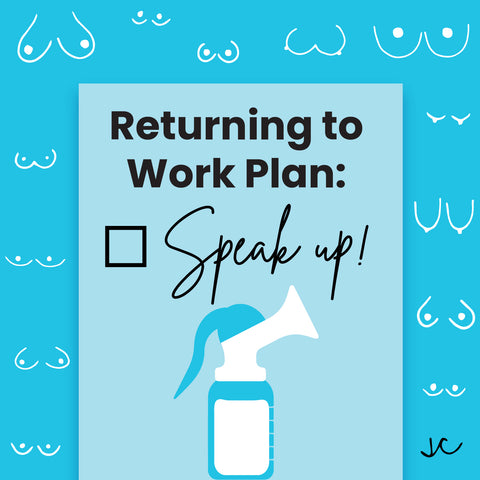Breaking News | Pregnant Workers Fairness Act

Estimated read time: 14 minutes
What You Should Know About the Pregnant Workers Fairness Act
Disclaimer: The information provided is not intended as legal advice. It is essential to consult with a local attorney and thoroughly research available resources to gain a comprehensive understanding of your rights.
Today (Tuesday, July 27, 2023), The Pregnant Workers Fairness Act went into effect and we are super excited to celebrate this incredible win for progress in women’s rights! We still have a way to go, however, this is a major step in the right direction, and we are thrilled to see this federal law start to take action for all the Mamas that are pregnant and postpartum workers!
Millions of mothers will finally have access to rights that will prevent resignations and job terminations of people having babies. No more pushing through the discomforts and limitations of pregnancy and postpartum at work.
The new law ensures that pregnant workers receive support in the workplace. It requires employers to provide reasonable accommodations for limitations related to pregnancy, childbirth, and related medical conditions. There is a lot of information to take in, and we are here to help break it all down for you.
If you are expecting, or are planning to get pregnant, then please keep on reading. And if you know someone that is currently pregnant, please share this information with them. It could be super helpful.
What is the Pregnant Workers Fairness Act (PWFA)?
If you are a pregnant worker, then you already have a lot going through your mind as it relates to your job and the new human you are building in your body. So, to help you clear through the clutter, we are breaking down the new federal law that provides workplace accommodations to pregnant people.
The Pregnant Workers Fairness Act is a game-changer for US women+. Last year, the new civil rights law was signed by President Joe Biden and it is effective as of today to provide “reasonable accommodations” to qualified workers’ known limitations related to pregnancy, childbirth, or related medical conditions. This includes protection during the postpartum period.
Does every employer have to abide by the Pregnant Workers Fairness Act?
The PWFA is a federal law, and it protects all qualified US employees and applicants of a “covered employer.” The term, ”covered employers,” refers to private and public sector employers with at least 15 employees, Congress, Federal agencies, employment agencies, and labor organizations.
What is considered "reasonable accommodations" for pregnant workers and postpartum workers?
If you are a pregnant worker, then you know that some pregnancy symptoms may get in the way of you performing your job the way you did prior to pregnancy. It is a lot of work to build an entire human and it can be exhausting even while you are doing the simplest of tasks or parts of your typical routine.
Similarly, returning to work after giving birth is also challenging and is also worthy of accommodations. By the way, if you are breastfeeding and need to pump, The PUMP Act provides nursing mothers a time and private place to pump at work (enforced by the U.S. Department of Labor).
According to the PWFA, “reasonable accommodations” related to pregnancy, childbirth, or related medical conditions are changes to the work environment or the way things are usually done at work.
Here is a list of some possible accommodations for pregnant and postpartum workers:
- Being able to sit or drink water
- Receiving closer parking
- Having flexible hours
- Receiving appropriately sized uniforms and safety apparel
- Receiving additional break time to use the bathroom, eat, and rest
- Taking leave or time off to recover from childbirth
- Being excused from strenuous activities and/or exposure to chemicals not safe for pregnancy
It’s important to note that “covered employers” are required to provide reasonable accommodations unless they would cause an “undue hardship” on the employer’s operations. An “undue hardship” is a significant difficulty or expense for the employer.
How do I gain access to “reasonable accommodations” at work during pregnancy and postpartum?
Speak up! Time to use your voice, even if it shakes. Your employer has no obligation to offer you help if you do not ask for it. It is not their legal duty to offer you accommodations. According to Daphne Delvaux of @themamattorney.
“They only have a legal duty to accommodate you if YOU asked for accommodations in the right way. Employers also may not retaliate against employees for asking for accommodations, even if they end up not being granted.
The pregnancy and postpartum period is a very vulnerable time, but you also have to be VERY strategic about your career. You have to protect your own health, your baby AND your paycheck AND the professional track you have worked so hard for. Fair? No. Possible? Yes, if you know your rights and you know the right language to use.”
Daphne offers a free attorney-drafted template to give you the exact language you need to ask for your accommodations under this law in a legally protected way.
Below are some of the tips that Daphne provides in one of her Instagram posts on how to request reasonable accommodations that are protected under the new federal law.
1. Give notice of your need for accommodation as early as possible.
Do it in writing! Communicate with both your direct supervisor(s) and HR, cc’ing both on your emails, and bcc'ing your personal email address. Be cooperative and proactive.
2. You do not have the right to decide on your own whether you can work or not.
Whether or not this accommodation can or will be granted needs to be explored through a dialogue between you, your employer, and your doctor. This is called the interactive process and your employer has a legal obligation to engage in this process. You are also expected to participate in this process.
3. Include a doctor's note.
You have the best chance of getting your accommodation granted if you also attach a doctor's note confirming your need for the accommodation. The note should specify the time frame needed for the accommodation. As it is pregnancy- or postpartum-related, this should be a specific window. Your employer is not obligated to accommodate an infinite accommodation.
From the lists of accommodations, an employee would typically request one accommodation for one medical event, but you could also propose a variety of accommodations as long as they are all reasonable. The accommodation process is flexible and fluid, and intentionally open-ended to allow for creativity of changes, tailored to your specific job.
There has also been some research that suggests what you eat while breastfeeding can influence your child’s food preferences as they grow up.
4. Your accommodation may be denied if it is an undue burden, but this is a very high bar for the employer.
They're not allowed to just say, "nah that doesn't work for us." They have an affirmative duty to TRY. The law exists to prevent resignations and terminations of pregnant and postpartum moms. If you are retaliated against for making this request, that could be unlawful.
Can I extend my maternity leave under the Pregnant Workers Fairness Act?
Did you know you can extend your leave rights based on postpartum anxiety or depression?
Daphne posted a helpful video on Instagram to share her expertise on this subject about requesting an extension of maternity leave or any other pregnancy or postpartum accommodation at work. The caption reads,
“An extension of your Maternity leave because of postpartum anxiety or depression is a reasonable accommodation to ask for under the PWFA. The Act protects against terminations or other adverse actions (like holding you back) based on your need for a reasonable accommodation. This means, you can focus on postpartum recovery while securing your job at the same time.
So many women around the US have lost their jobs because of postpartum issues, and it’s one of the most heartbreaking things because it’s such a vulnerable time, and these families also NEED income and healthcare.
Disclaimer: 2 months mat leave extension is not a guarantee. It is the average of what I see with my clients. It will be up to your doctor and your employer to determine the length of the leave extension. This is not legal advice but a scenario based on my experience. You have to go through the interactive process to receive accommodation, which also means going to your doctor and sharing some medical information. Employers may deny based on undue hardship (which is a very high bar). Please know your employer does not have to accommodate an infinite leave. You have to commit to a return date.”
What are other pregnant workers rights?
Along with the PWFA, there are also other laws that apply to workers affected by pregnancy, childbirth, or related medical conditions.
- Title VII – Prohibits employment discrimination based on sex, pregnancy, or other protected categories enforced by the U.S. Equal Employment Opportunity Commission (EEOC).
- The ADA – Prohibits employment discrimination based on disability (enforced by the EEOC)
- The Family and Medical Leave Act – Provides unpaid leave for certain workers for pregnancy and to bond with a new child (enforced by the U.S Department of Labor)
- The PUMP Act – Provides nursing mothers a time and private place to pump at work (enforced by the U.S. Department of Labor).
The PWFA applies to employers who have 15 employees and over, so according to Daphne Delvaux of @themamattorney, “if you didn’t qualify for relief under The Family and Medical Leave Act, you may have rights under the PWFA. AND you may have additional rights under your state law (like in CA, you have both leave rights and accommodation rights when you work for an employer with 5 or more employees).”
How to file a charge of employment discrimination protected by the Pregnant Workers Fairness Act
In order to protect employees from employment discrimination, Congress designated a federal agency called the U.S. Equal Employment Opportunity Commission (EEOC) to implement and enforce federal laws that make it illegal to discriminate against job applicants and employees. The EEOC is responsible for enforcing the Pregnancy Workers Fairness Act and have started to accept charges of discrimination under this new statute for incidents occurring on or after June 27, 2023.
If you believe that you have been denied reasonable accommodation for pregnancy, childbirth, or related medical conditions, consult with an attorney. Charges can be reported by contacting the EEOC at 1-800-669-4000 or by filing a charge online.
Know your rights, Mama
The most important thing to remember is that you matter. Pregnancy, childbirth, and postpartum are hard. You will get through this. Educate yourself with the current policies of your State and employer and be prepared to advocate for yourself.
The Pregnant Workers Fairness Act is a huge win for millions of mothers across the country, however, the US still has a long way to go to provide the appropriate amount of support for parents, especially birthing parents. We need federal paid leave, postpartum support, and childcare support that reflects the amount of work that goes into parenthood and raising future generations. There is still work to do to be done.
Keep on sharing your experiences and make your voices heard for what we need as mothers. We can create change!
At Titty City Design, we believe that every boobie is beautiful, and that should be celebrated. We are a female-owned and operated, small business here to spread self-love and body positivity with our line of boob apparel, boob accessories, and boob-themed decor and products for the home. A portion of our proceeds goes to help support postpartum people and breast cancer patients.
Unique Gifts for New Moms They Will Love











